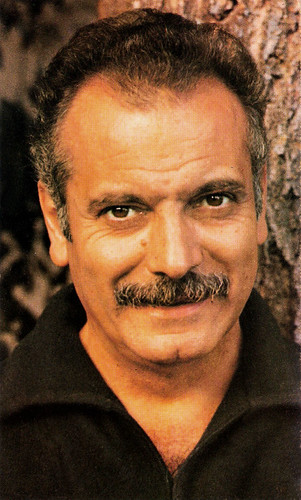
French postcard by PSG, offered by Corvisart, Epinal, no. 1131. Photo: Aubert-Philips.
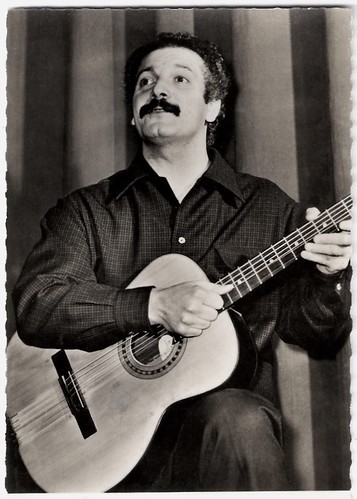
French postcard by Editions P.I., Paris. no. 965. Photo: Studio Vauclair.
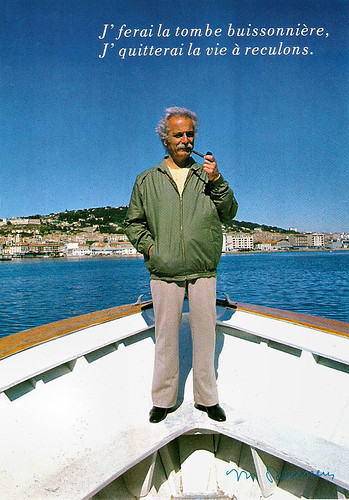
French postcard by Editions Cap Theojac, Toulouse. Photo: Jimmy Rague. Caption: J'ferai la tombe buissonnière. J'quitterai la vie à reculons. (I'll skip the tomb. I leave life backwards).
A gift for poetry and creativity
Georges Charles Brassens was born in 1921 in the town of Sète, a town in southern France near Montpellier. Brassens grew up in the family home in Sète with his mother, Elvira Dagrosa, father Jean-Louis, half-sister Simone, and paternal grandfather Jules. His mother was a devout Roman Catholic, while his father was an easy-going, generous, open-minded, anticlerical man. Brassens grew up between these two starkly contrasting personalities, who nonetheless shared a love for music. His mother, Simone and Jules, were always singing. This environment imparted to Brassens a passion for singing that would come to define his life.
A poor student, Brassens performed badly in school. Alphonse Bonnafé, his literature teacher strongly encouraged the 15-years-old Brassens’s apparent gift for poetry and creativity. Bonnafé would later write the first Brassens biography in 1963. Georges listened constantly to his early idols: Charles Trenet, Tino Rossi, and Ray Ventura. At age seventeen, Georges and his gang started to steal from their families and others. Georges stole a ring and a bracelet from his sister. The police found and caught him, which caused a scandal. The young men were publicly characterised as ‘voyous’ (high school scum). Brassens was expelled from school.
Following a short trial as an apprentice mason in his father's business, he moved to Paris in 1940 to live with his aunt and work at the Renault car factory. In the meantime, he learned piano and wrote some of his first original compositions. He stayed there after World War II had broken out and he felt that this was where his future lay and wrote his first collection of poems. Brassens published two short poetry collections in 1942, thanks to the money of his family and friends.
In 1943, he was forced by the Germans to work in a labour camp at a BMW aircraft engine plant in Basdorf near Berlin in Germany. Here Brassens met some of his future friends, such as Pierre Onténiente, whom he called Gibraltar because he was "steady as a rock." Onténiente later became his right-hand man and his private secretary.
After being given ten days' leave in France, he took refuge in a small cul-de-sac called 'Impasse Florimont', in the 14th arrondissement of Paris. Without much else to occupy him, Brassens spent his days composing songs and writing music, eventually teaching himself the guitar based on his prior experience with the mandolin. There he lived for several years with its owner, Jeanne Planche and her husband Marcel, in relative poverty: without gas, running water, or electricity. Brassens remained hidden there until the end of the war five months later but ended up staying for 22 years. Planche was the inspiration for Brassens's song Jeanne.
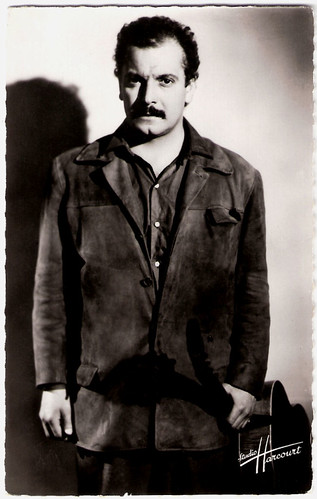
French postcard by Editions du Globe, no. 238. Photo: Studio Harcourt.
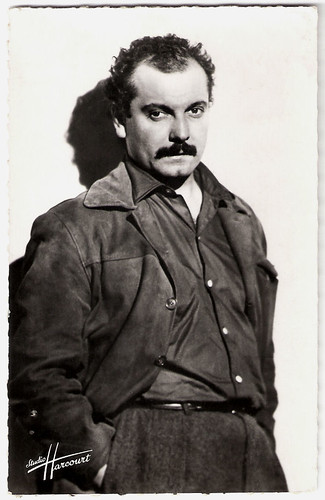
French postcard by Editions du Globe, no. 239. Photo: Studio Harcourt.
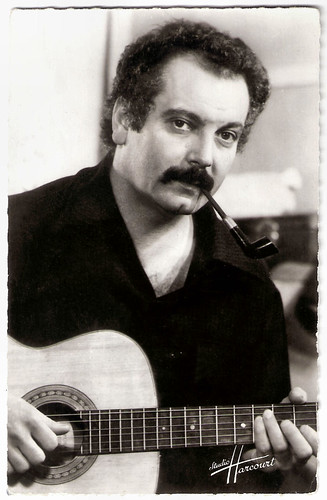
French postcard by Editions du Globe, Paris, no. 760. Photo: Studio Harcourt.
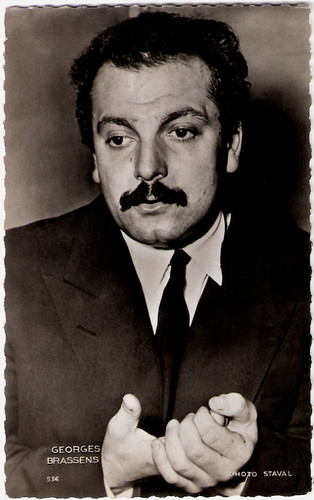
French postcard by Editions P.I., no. 536. Photo: Staval.
Gates of Paris
In 1946, after the war had ended, Georges Brassens published the first of a series of virulent, black humour-tinged articles in the anarchist journal Le Libertaire. The following year, he also published his first novel, 'La Lune Écoute Aux Portes', and met Joha Heiman, the woman he would love - and write about - for the remainder of his life. His friends who heard and liked his songs urged him to go and try them out in a cabaret, café or concert hall. He was shy and had difficulty performing in front of people. At first, he wanted to sell his songs to well-known singers such as les frères Jacques.
In 1952 he met the singer Patachou, owner of a very well-known cafe, Les Trois Baudets. Though Brassens had never considered himself a singer, Patachou convinced him to try his hand at performing himself. A bass player present at the audition, Pierre Nicolas, quickly joined Brassens in support and would serve in that capacity for the remainder of the singer's career. Jacques Brel and Léo Ferré came also into the music industry with the help of Patachou. With her help, Brassens met Polydor exec Jacques Canetti, and he landed a record deal.
His first single, 'Le Gorille', was released later in 1952, and stirred up controversy with its strong anti-death penalty stance; in fact, it was banned from French radio until 1955. In these years, Brassens achieved fame with his elegant songs with their harmonically complex music for voice and guitar and articulate, diverse lyrics. He won the prestigious Grand Prix du Disque de l'Academie Charles Cros in 1954 for his EP 'Le Parapluie', and spent much of the year touring Europe and northern Africa. In 1957, he made his film debut in Porte des Lilas/Gates of Paris (René Clair, 1957). An old bum (Pierre Brasseur) becomes infatuated with a pretty young girl (Dany Carrel) who gets entangled with a young gangster (Henri Vidal). Brassens played an important part as the bum’s friend, L'Artiste, a taciturn, solitary bard, whose character seems based on Brassens himself.
Peter Beagle at IMDb: “The film turned out to be a delightful, warmhearted work, holding up remarkably well on repeated viewings, and Brassens makes an excellent deadpan foil for the great Pierre Brasseur. And the songs he wrote for the film remain among the best of his classic repertoire.” Brassens performed his songs in several other films, but his main focus was live performing. He, later on, made several appearances at the Paris Olympia and at the Bobino music hall theatre. He toured with Pierre Louki, who wrote a book of recollections entitled 'Avec Brassens'. During these performances, he accompanied himself on acoustic guitar. Most of the time the only other accompaniment came from his friend Pierre Nicolas with a double bass, and sometimes a second guitar (Barthélémy Rosso, Joël Favreau).
He released several more LPs over the remainder of the 1950s, during which time chronic kidney ailments began to affect his health, resulting in periodic hospitalisations. In the following decades, he continued to tour. His songs often decry hypocrisy and self-righteousness in the conservative French society of the time, especially among the religious, the well-to-do, and those in law enforcement. The criticism is often indirect, focusing on the good deeds or innocence of others in contrast. His elegant use of florid language and dark humour, along with bouncy rhythms, often give a rather jocular feel to even the grimmest lyrics. Brassens’s lyrics are difficult to translate, though his work is translated into more than 20 languages. Georges Brassens died of cancer in 1981, in Saint-Gély-du-Fesc, having suffered health problems for many years. He was 60. Brassens rests at the Cimetière le Py in Sète. Steve Huey at AllMusic: “Along with Jacques Brel, he became one of the most unique voices on the French cabaret circuit, and exerted a tremendous influence on many other singers and songwriters of the postwar era. His poetry and lyrics are still studied as part of France's standard educational curriculum.”
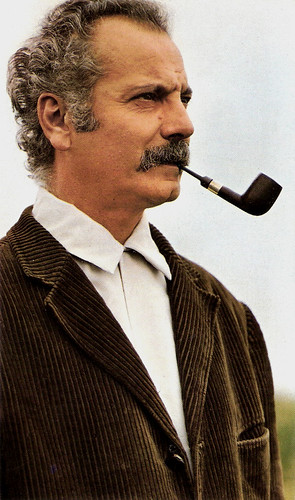
French postcard.
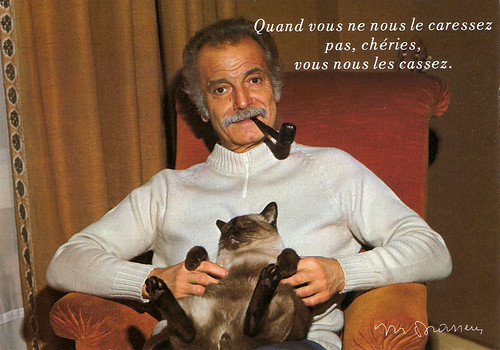
French postcard by Editions Cap Theojac, Toulouse. Photo: Jimmy Rague. Caption: Quand vous ne nous le caressez pas, chèries, vous nous les cassez. (When you do not stroke us, darlings, you break us).
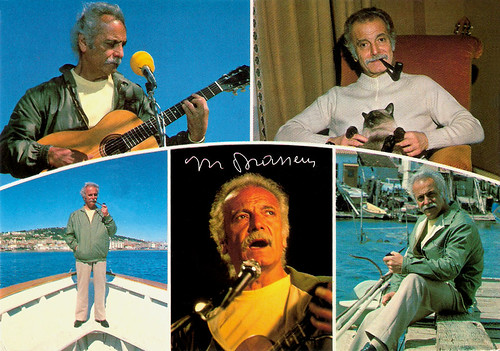
French postcard by Editions Cap Theojac, Toulouse. Sent by mail in 1986. Photos: Jimmy Rague.
Gorges Brassens sings 'Le Gorille'. Source: fabrizio lencioni (YouTube).
Scene from Porte des Lilas/Gates of Paris (René Clair, 1957) with Brassens singing Au Bois de Mon Coeur. Source: Daniel Bernard (YouTube).
This post was last updated on 30 July 2023.
No comments:
Post a Comment